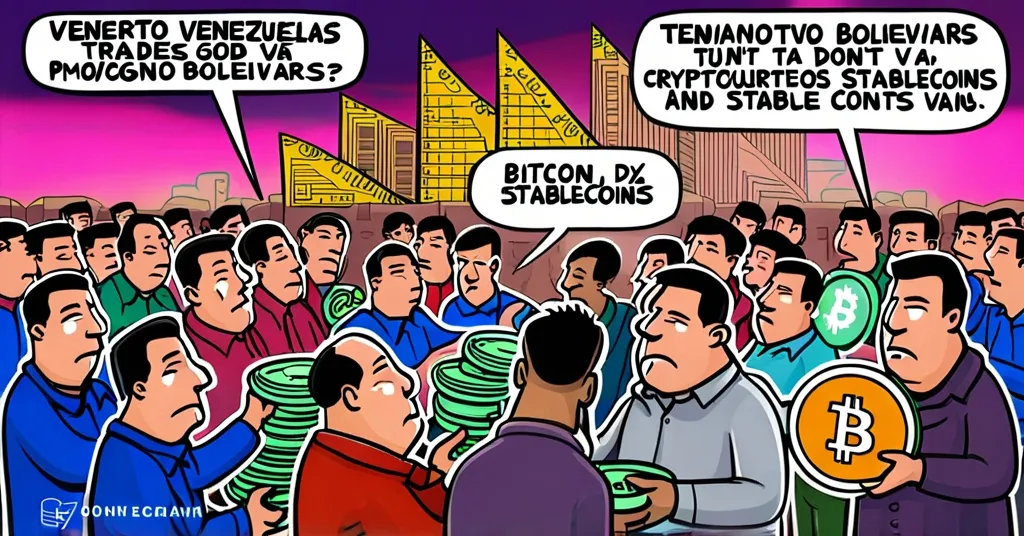Venezuelans Embrace Crypto Amid Hyperinflation: $20B Influx in 2024

Venezuelans Ditching the Dollar in Favor of Crypto
Venezuelans are increasingly turning to cryptocurrencies like Bitcoin, Ethereum, and stablecoins to combat the rampant hyperinflation and protect their finances from the devaluing bolivar.
- Venezuelans using crypto to fight hyperinflation and secure finances.
- Crypto market in Venezuela grew by 110% in Q2 2024.
- $20 billion flowed into Venezuela via crypto in 2024.
- Inflation surged to 4% in October 2024, driving more citizens to stablecoins.
- 47% of crypto transactions under $10,000 involved stablecoins.
- Government’s Petro project failed due to corruption.
- President Maduro interested in revisiting crypto policies.
- Crypto exchanges operate in an unregulated “grey zone.”
As Venezuela grapples with an economic crisis, the bolivar’s value continues to plummet. Hyperinflation, which means extremely high and rapidly increasing inflation rates, has spiked from under 1% in September to 4% in October, with further increases in November. In this environment, where the bolivar’s value fluctuates wildly, cryptocurrencies pegged to stable assets like the US dollar, known as stablecoins, are becoming essential tools for many Venezuelans.
“Stablecoins have become popular because they are pegged to more stable fiat currencies, such as the US dollar. They offer a hedge against the volatility of the Venezuelan bolivar. […] They play a crucial role in daily transactions and remittances.” – Dan Cartolin, Enterprise Account Executive, Chainalysis.
The growth in Venezuela’s crypto market has been significant, with a 110% increase in Q2 2024. This surge has brought approximately $20 billion into the country, representing about 20% of its GDP. This isn’t just about speculation; it’s a lifeline for many Venezuelans struggling to survive amidst an economy where traditional financial systems are failing.
However, the path to crypto adoption is not without its challenges. The government’s previous attempt to create its own cryptocurrency, the Petro, ended in disaster due to widespread corruption and subsequent mass arrests. President Nicolás Maduro, whose controversial election has left many questioning his leadership, has expressed interest in revisiting the crypto “path,” but the regulatory environment remains murky. Crypto exchanges operate in an unregulated “grey zone,” leaving users and service providers vulnerable to risks.
“Everything is in the grey zone here. It is impossible to know if I am laundering someone’s money [when I am exchanging crypto for clients].” – Vanesa, Venezuelan citizen providing crypto exchange services.
Despite these obstacles, the resilience of Venezuelans shines through. Many are using Bitcoin to receive remittances from family abroad, while others are leveraging stablecoins for daily transactions. Ethereum is also gaining traction, with some using it for decentralized finance projects to earn interest on their savings despite the economic turmoil. Yet, the unregulated nature of crypto exchanges poses significant risks, including scams and fraud, which are rampant in Venezuela’s crypto landscape.
While cryptocurrencies offer a glimmer of hope, they are not a panacea. The lack of regulation and consumer protections can lead to financial losses, and the government’s failed initiatives, like the Petro, serve as a stark reminder of the pitfalls of governmental involvement in crypto. Nevertheless, the optimism surrounding cryptocurrencies remains strong, fueled by the belief in their potential to provide financial freedom and stability.
The rise of crypto adoption in Latin America is particularly evident in Venezuela, where bitcoin and other cryptocurrencies are becoming essential tools for navigating economic instability. This trend is not unique to Venezuela; across the region, digital currencies are increasingly seen as a means to protect against currency devaluation and inflation.
Yet, the journey into crypto is not without its humor. Imagine trying to hold onto a slippery fish—that’s what using the bolivar feels like for many Venezuelans. Cryptocurrencies, on the other hand, offer a more stable net, albeit one that requires navigating a sea of regulatory uncertainty and potential scams.
The Petro project’s failure wasn’t just a disappointment; it was a colossal waste of time and resources, mired in corruption from the start. It’s a reminder that while cryptocurrencies can offer hope, they also require vigilance and a critical eye towards government involvement.
As we look to the future, the role of cryptocurrencies in Venezuela will continue to evolve. President Maduro’s recent statements suggest a possible shift in policy, but the unpredictable regulatory landscape remains a significant hurdle. Venezuelans’ use of crypto reflects a broader movement towards financial sovereignty and resilience in the face of adversity.
Key Questions and Takeaways
- Why are Venezuelans turning to cryptocurrencies?
Venezuelans are using cryptocurrencies to protect their finances from the devaluation of the bolivar and the effects of hyperinflation.
- How has the Venezuelan crypto market grown in 2024?
The Venezuelan crypto market grew by 110% in Q2 2024, with an estimated $20 billion entering the ecosystem.
- What role do stablecoins play in Venezuela?
Stablecoins provide a hedge against the volatility of the Venezuelan bolivar and are crucial for daily transactions and remittances.
- What challenges do crypto users face in Venezuela?
Users face an unpredictable regulatory environment, with crypto exchanges remaining unregulated and operating in a “grey zone.”
- What was the outcome of the Petro cryptocurrency project?
The Petro project was shut down following corruption and mass arrests, representing a failed governmental crypto initiative.
- How has inflation affected Venezuela in 2024?
Inflation increased to 4% in October from under 1% in September, with further rises reported in November, driving more citizens toward stablecoins.
- What is the current stance of President Maduro on cryptocurrencies?
Maduro has expressed interest in revisiting the crypto “path,” despite the failure of the Petro project and ongoing regulatory challenges.



